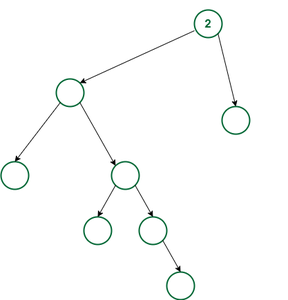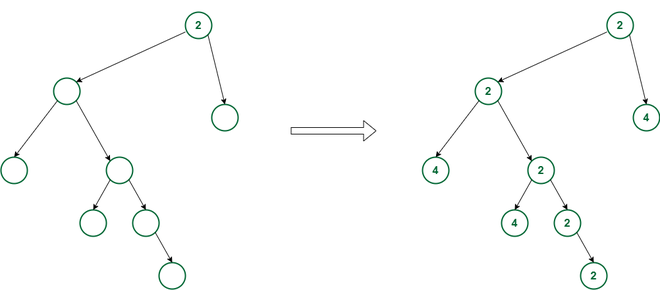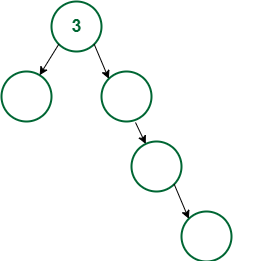通过填充给定的空树来最小化节点值的总和,使得每个节点都是其子节点的 GCD
给定一棵由N个没有值的节点和一个整数X组成的二叉树,它表示根节点的值,任务是找到给定树的所有节点值的最小总和,使得每个节点的值node 必须是其子节点的 GCD 值。此外,没有两个兄弟姐妹可以具有相同的值。
例子:
Input:

Output: 22
Explanation: The given tree can be filled as shown below:

Input:

Output: 18
Explanation: The given tree can be filled as shown below:

方法:为了最小化总和,两个孩子都可以有X和2*X的值,其中X是父母的值。现在,如果节点只有一个子节点,那么它的值将等于它的父节点。但是为了决定哪个孩子应该有X和2*X的值以获得最小和,将考虑每个节点的每个子树的深度。具有更大深度的孩子将被赋予X值,以便它可以将其转移给更多的孩子,而另一个孩子将获得2*X的值。请按照以下步骤解决此问题:
- 找到每个节点的深度并将其存储在地图中,并与节点地址一起作为键。
- 现在,从根节点开始执行 DFS 遍历,如果节点的深度大于其兄弟节点,则在每次调用中为节点分配X值。否则,分配值2*X 。
- 完成上述步骤后,在回溯的同时找到左右孩子值的总和,并返回总和,即每次调用中左孩子、右孩子和当前节点的值之和。
- 完成上述步骤后,打印从DFS 调用返回的值作为可能的最小总和。
下面是上述方法的实现:
C++
// C++ program for the above approach
#include
using namespace std;
// Structure of Tree Node
class Node {
public:
int val;
Node *left, *right;
Node(int val)
{
this->val = val;
left = NULL;
right = NULL;
}
};
class Tree {
public:
unordered_map depth;
// Function to find the depth of all
// nodes and store it in map depth
int findDepth(Node* cur)
{
int mx = 0;
if (cur->left) {
mx = findDepth(cur->left);
}
if (cur->right) {
mx = max(mx, findDepth(cur->right));
}
// Update and return the maximum
// depth of the tree
return depth[cur] = mx + 1;
}
// Function to assign values to nodes
// and return the minimum sum possible
int dfs(Node* cur, bool flag, int parValue)
{
if (parValue != -1) {
if (flag)
cur->val = parValue;
else
cur->val = parValue * 2;
}
int l = 0, r = 0;
if (cur->left && cur->right) {
if (depth[cur->left] > depth[cur->right]) {
l = dfs(cur->left, 1, cur->val);
r = dfs(cur->right, 0, cur->val);
}
else {
l = dfs(cur->left, 0, cur->val);
r = dfs(cur->right, 1, cur->val);
}
}
else if (cur->left) {
l = dfs(cur->left, 1, cur->val);
}
else if (cur->right) {
r = dfs(cur->right, 1, cur->val);
}
return l + r + cur->val;
}
// Function to find the minimum sum
// for the given tree by assign the
// values to the node according to
// the given criteria
int minimumSum(Node* root)
{
// Find the maximum depth
findDepth(root);
// Calculate the minimum sum and
// return it
return dfs(root, 1, -1);
}
};
// Driver Code
int main()
{
// Given root node value
int X = 2;
// Given empty tree structure
Node* root = new Node(X);
root->left = new Node(-1);
root->right = new Node(-1);
root->left->left = new Node(-1);
root->left->right = new Node(-1);
root->left->right->left = new Node(-1);
root->left->right->right = new Node(-1);
root->left->right->right->left = new Node(-1);
Tree t;
// Fill the tree and print minimum tree sum
cout << t.minimumSum(root);
return 0;
} Java
// Java program for the above approach
import java.util.*;
public class Main
{
// Structure of Tree Node
static class Node {
public int val;
public Node left, right;
public Node(int val)
{
this.val = val;
left = right = null;
}
}
static HashMap depth = new HashMap<>();
// Function to find the depth of all
// nodes and store it in map depth
static int findDepth(Node cur)
{
int mx = 0;
if (cur.left != null) {
mx = findDepth(cur.left);
}
if (cur.right != null) {
mx = Math.max(mx, findDepth(cur.right));
}
// Update and return the maximum
// depth of the tree
depth.put(cur, mx + 1);
return depth.get(cur);
}
// Function to assign values to nodes
// and return the minimum sum possible
static int dfs(Node cur, int flag, int parValue)
{
if (parValue != -1) {
if (flag == 1)
cur.val = parValue;
else
cur.val = parValue * 2;
}
int l = 0, r = 0;
if (cur.left != null && cur.right != null) {
if (depth.containsKey(cur.left) && depth.containsKey(cur.right) && depth.get(cur.left) > depth.get(cur.right)) {
l = dfs(cur.left, 1, cur.val);
r = dfs(cur.right, 0, cur.val);
}
else {
l = dfs(cur.left, 0, cur.val);
r = dfs(cur.right, 1, cur.val);
}
}
else if (cur.left != null) {
l = dfs(cur.left, 1, cur.val);
}
else if (cur.right != null) {
r = dfs(cur.right, 1, cur.val);
}
return (l + r + cur.val);
}
// Function to find the minimum sum
// for the given tree by assign the
// values to the node according to
// the given criteria
static int minimumSum(Node root)
{
// Find the maximum depth
findDepth(root);
// Calculate the minimum sum and
// return it
return dfs(root, 1, -1);
}
// Driver code
public static void main(String[] args)
{
// Given root node value
int X = 2;
// Given empty tree structure
Node root = new Node(X);
root.left = new Node(-1);
root.right = new Node(-1);
root.left.left = new Node(-1);
root.left.right = new Node(-1);
root.left.right.left = new Node(-1);
root.left.right.right = new Node(-1);
root.left.right.right.left = new Node(-1);
// Fill the tree and print minimum tree sum
System.out.print(minimumSum(root));
}
}
// This code is contributed by suresh07. Python3
# Python3 program for the above approach
# Structure of Tree Node
class Node:
def __init__(self, val):
self.val = val
self.left = None
self.right = None
depth = {}
# Function to find the depth of all
# nodes and store it in map depth
def findDepth(cur):
mx = 0
if (cur.left != None):
mx = findDepth(cur.left)
if (cur.right != None):
mx = max(mx, findDepth(cur.right))
# Update and return the maximum
# depth of the tree
depth[cur] = mx + 1
return depth[cur]
# Function to assign values to nodes
# and return the minimum sum possible
def dfs(cur, flag, parValue):
if (parValue != -1):
if flag:
cur.val = parValue
else:
cur.val = parValue * 2
l, r = 0, 0;
if (cur.left != None and cur.right != None):
if ((cur.left in depth) and (cur.right in depth) and depth[cur.left] > depth[cur.right]):
l = dfs(cur.left, 1, cur.val)
r = dfs(cur.right, 0, cur.val)
else:
l = dfs(cur.left, 0, cur.val)
r = dfs(cur.right, 1, cur.val)
elif (cur.left != None):
l = dfs(cur.left, 1, cur.val)
elif (cur.right != None):
r = dfs(cur.right, 1, cur.val)
return (l + r + cur.val)
# Function to find the minimum sum
# for the given tree by assign the
# values to the node according to
# the given criteria
def minimumSum(root):
# Find the maximum depth
findDepth(root)
# Calculate the minimum sum and
# return it
return dfs(root, 1, -1)
# Given root node value
X = 2
# Given empty tree structure
root = Node(X)
root.left = Node(-1)
root.right = Node(-1)
root.left.left = Node(-1)
root.left.right =Node(-1)
root.left.right.left = Node(-1)
root.left.right.right = Node(-1)
root.left.right.right.left = Node(-1);
# Fill the tree and print minimum tree sum
print(minimumSum(root))
# This code is contributed by mukesh07.C#
// C# program for the above approach
using System;
using System.Collections.Generic;
class GFG {
// Structure of Tree Node
class Node {
public int val;
public Node left, right;
public Node(int val)
{
this.val = val;
left = right = null;
}
}
static Dictionary depth = new Dictionary();
// Function to find the depth of all
// nodes and store it in map depth
static int findDepth(Node cur)
{
int mx = 0;
if (cur.left != null) {
mx = findDepth(cur.left);
}
if (cur.right != null) {
mx = Math.Max(mx, findDepth(cur.right));
}
// Update and return the maximum
// depth of the tree
depth[cur] = mx + 1;
return depth[cur];
}
// Function to assign values to nodes
// and return the minimum sum possible
static int dfs(Node cur, int flag, int parValue)
{
if (parValue != -1) {
if (flag == 1)
cur.val = parValue;
else
cur.val = parValue * 2;
}
int l = 0, r = 0;
if (cur.left != null && cur.right != null) {
if (depth.ContainsKey(cur.left) && depth.ContainsKey(cur.right) && depth[cur.left] > depth[cur.right]) {
l = dfs(cur.left, 1, cur.val);
r = dfs(cur.right, 0, cur.val);
}
else {
l = dfs(cur.left, 0, cur.val);
r = dfs(cur.right, 1, cur.val);
}
}
else if (cur.left != null) {
l = dfs(cur.left, 1, cur.val);
}
else if (cur.right != null) {
r = dfs(cur.right, 1, cur.val);
}
return (l + r + cur.val);
}
// Function to find the minimum sum
// for the given tree by assign the
// values to the node according to
// the given criteria
static int minimumSum(Node root)
{
// Find the maximum depth
findDepth(root);
// Calculate the minimum sum and
// return it
return dfs(root, 1, -1);
}
static void Main() {
// Given root node value
int X = 2;
// Given empty tree structure
Node root = new Node(X);
root.left = new Node(-1);
root.right = new Node(-1);
root.left.left = new Node(-1);
root.left.right = new Node(-1);
root.left.right.left = new Node(-1);
root.left.right.right = new Node(-1);
root.left.right.right.left = new Node(-1);
// Fill the tree and print minimum tree sum
Console.Write(minimumSum(root));
}
}
// This code is contributed by divyesh072019. Javascript
输出
22时间复杂度: O(N)
辅助空间: O(1)